
Julius Henry "Groucho" Marx was an American comedian, actor, writer, and singer who performed in film, television, radio, stage, and vaudeville. He was a master of quick wit and is generally considered to have been one of America's greatest comedians.

The Marx Brothers were an American family comedy act that was successful in vaudeville, on Broadway, and in 14 motion pictures from 1905 to 1949. Five of the Marx Brothers' fourteen feature films were selected by the American Film Institute (AFI) as among the top 100 comedy films, with two of them, Duck Soup (1933) and A Night at the Opera (1935), in the top fifteen. They are widely considered by critics, scholars and fans to be among the greatest and most influential comedians of the 20th century. The brothers were included in AFI's 100 Years... 100 Stars list of the 25 greatest male stars of Classical Hollywood cinema, the only performers to be included collectively.

Duck Soup is a 1933 American pre-Code musical black comedy film written by Bert Kalmar and Harry Ruby, with additional dialogue by Arthur Sheekman and Nat Perrin, directed by Leo McCarey. Released by Paramount Pictures on November 17, 1933, it stars the Marx Brothers and also features Margaret Dumont, Louis Calhern, Raquel Torres and Edgar Kennedy. Duck Soup was the last of five Marx Brothers films released by Paramount Pictures. Groucho portrays the newly installed president of the fictional country of Freedonia. Zeppo is his secretary, while Chico and Harpo are spies for the neighboring country of Sylvania. Relations between Groucho and the Sylvanian ambassador deteriorate during the film, and they go to war at the conclusion.
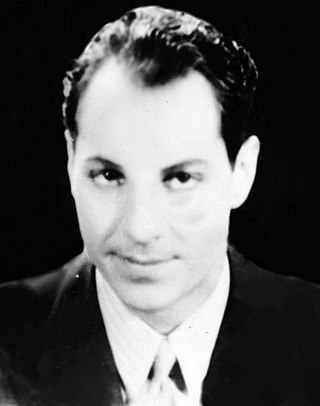
Herbert Manfred "Zeppo" Marx was an American comedic actor, theatrical agent and engineer. He was the youngest and last survivor of the five Marx Brothers. He appeared in the first five Marx Brothers feature films from 1929 to 1933, and then left the act for careers as an engineer and theatrical agent.

Margaret Dumont was an American stage and film actress. She is best remembered as the comic foil to the Marx Brothers in seven of their films; Groucho Marx called her "practically the fifth Marx brother."

William Bendix was an American film, radio, and television actor, who typically played rough, blue-collar characters. He is best remembered for his role in Wake Island, which earned him an Academy Award nomination for Best Supporting Actor. He also portrayed the clumsily earnest aircraft plant worker Chester A. Riley in both the radio and television versions of The Life of Riley, and baseball player Babe Ruth in The Babe Ruth Story. Bendix was a frequent co-star of Alan Ladd, the two appearing in ten films together; both actors coincidentally died in 1964.

A Day at the Races is a 1937 American comedy film, and the seventh film starring the Marx Brothers, with Allan Jones, Maureen O'Sullivan and Margaret Dumont. Like their previous Metro-Goldwyn-Mayer feature A Night at the Opera, this film was a major hit.
Harry Rubenstein, known professionally as Harry Ruby, was an American actor, pianist, composer, songwriter and screenwriter, who was inducted into the Songwriters Hall of Fame in 1970. He was married to silent film actress Eileen Percy.
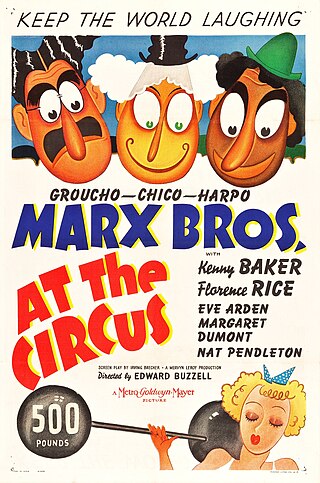
At the Circus is a 1939 comedy film starring the Marx Brothers released by Metro-Goldwyn-Mayer in which they help save a circus from bankruptcy. The film contains Groucho Marx's classic rendition of "Lydia the Tattooed Lady". The supporting cast includes Florence Rice, Kenny Baker, Margaret Dumont, and Eve Arden. The songs, including "Lydia the Tattooed Lady", "Two Blind Loves", and "Step Up and Take a Bow", were written by the team of Harold Arlen and Yip Harburg.

You Bet Your Life is an American comedy quiz series that has aired on both radio and television. The original version was hosted by Groucho Marx of the Marx Brothers, with announcer and assistant George Fenneman. The show debuted on ABC Radio on October 27, 1947, moved to CBS Radio debuting October 5, 1949, and went to NBC-TV and NBC Radio on October 4, 1950. Because of its simple format, it was possible to broadcast the show on both radio and television but not simultaneously. Many of the laughs on the television show were evoked by Groucho's facial reactions and other visual gimmicks; the two versions were slightly different. The last episode in a radio format aired on June 10, 1960. The series continued on television for another year, recording a season on September 22, 1960 with a new title, The Groucho Show.
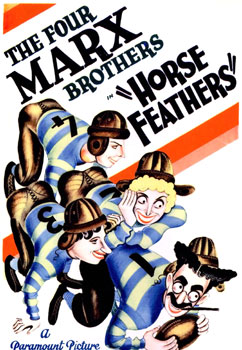
Horse Feathers is a 1932 American pre-Code comedy film starring the Marx Brothers. It stars the Four Marx Brothers, Thelma Todd and David Landau. It was written by Bert Kalmar, Harry Ruby, S. J. Perelman, and Will B. Johnstone. Kalmar and Ruby also wrote the original songs for the film. Several of the film's gags were taken from the Marx Brothers' stage comedy from the 1900s, Fun in Hi Skule. The term "horse feathers" is U.S. slang for "nonsense, rubbish, balderdash," attributed originally to Billy DeBeck.

Monkey Business is a 1931 American pre-Code comedy film. It is the third of the Marx Brothers' released movies, and the first with an original screenplay rather than an adaptation of one of their Broadway shows. The film also features Thelma Todd, Harry Woods and Ruth Hall. It is directed by Norman Z. McLeod with screenplay by S. J. Perelman and Will B. Johnstone. Much of the story takes place on an ocean liner crossing the Atlantic Ocean.

The Hollywood Palace is an hourlong American television variety show broadcast Saturday nights on ABC from January 4, 1964, to February 7, 1970. Titled The Saturday Night Hollywood Palace for its first few weeks, it began as a midseason replacement for The Jerry Lewis Show, another variety show, which lasted only three months.

Go West is a 1940 American Comedy Western film from Metro-Goldwyn-Mayer starring the Marx Bros. In their tenth film, head to the American West and attempt to unite a couple by ensuring that a stolen property deed is retrieved. The film was directed by Edward Buzzell and written by Irving Brecher.
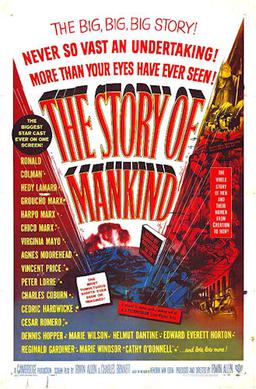
The Story of Mankind is a 1957 American dark fantasy film loosely based on the nonfiction book The Story of Mankind (1921) by Hendrik Willem van Loon. The film was directed and coproduced by Irwin Allen and released by Warner Bros.

Double Dynamite is a 1951 American musical comedy film directed by Irving Cummings and starring Jane Russell, Groucho Marx, and Frank Sinatra. The film was written by Leo Rosten (story), Melville Shavelson (screenplay), Mannie Manheim, and Harry Crane.

Dee Hartford was an American television actress. She was married to Howard Hawks from 1953 to 1959. Her sister was actress Eden Hartford; her former brother-in-law was comedian Groucho Marx.

Copacabana is a 1947 American musical comedy film directed by Alfred E. Green starring Carmen Miranda, Groucho Marx and Steve Cochran. The film is a showcase for Miranda, who performs several numbers in her usual style, including a high-energy rendition of "Tico-Tico". Groucho, as Lionel, her fiance and agent, also sings a musical number, "Go West, Young Man", wearing his traditional greasepaint brows, mustache, and baggy suit. This was Groucho's first significant film appearance as a solo act, minus Harpo and Chico.
A Girl in Every Port may refer to:
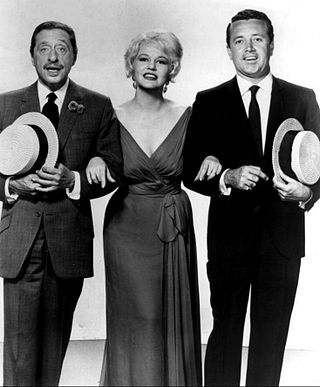
The DuPont Show of the Week is an American television anthology drama series that aired on NBC from September 17, 1961 to September 6, 1964. During its time on the air, the program "was NBC's late Sunday evening 'class' showcase".


















